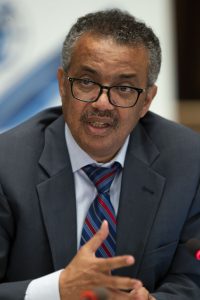
In the Covid-19 response, why are some high-income countries being outperformed by countries with fewer resources? What are the merits of a multilateralist approach in a crisis like Covid-19? What is it like being in the eye of the storm as head of the World Health Organization through a global health crisis? These are some of the questions Dr Tedros Adhanom Ghebreyesus, director-general of the WHO discusses with Professor Senait Fisseha, director of Global Programs at the Susan Thompson Buffett Foundation
Senait Fisseha: We’re approaching a year since the first cluster of Covid cases were reported to the World Health Organization. On this and on other major global health issues, how is the WHO using its experience of working with philanthropy?
Tedros Adhanom Ghebreyesus: Even before Covid, philanthropic organisations were committed to contributing to global health, so I was not surprised when many scaled up their response in very flexible ways, not only in building up the health systems of individual countries, but also investing in global and regional institutions like WHO and Africa CDC. The response of philanthropic organisations in general has been very encouraging. Their flexibility has helped them move quickly to change their priorities.
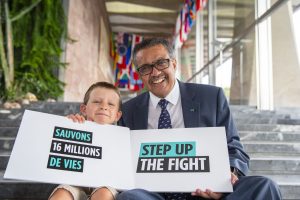
Supporting StepUpTheFight commitment to end Aids, tuberculosis and malaria. Credit: WHO/Mark Nieuwenhof
SF: In recent years we have seen a growing trend for private foundations and donors to contribute to the WHO alongside member states. What are your thoughts on that shift and what are some of the benefits and challenges of working with philanthropists along with member states?
TAG: There is a growing trend of private foundations and donors contributing to WHO and this is very important as it broadens our donors base. We welcome this. There is great potential, and great need, for the philanthropic sector to partner with WHO and health organisations around the world. And this is possible if you agree on the objectives, especially at country level, then you can cooperate with anyone because your interests are aligned.
But there have been challenges. For instance, they can come when a donor member state or a donor philanthropic organisation has their own priorities, which may not be fully aligned with those of the country. If the priorities are not aligned, then any assistance will not remedy the problems that country is facing.
This lack of alignment comes for two reasons: one, when a donor country or philanthropic organisation says, ‘I know their problems so I can help them’. But it is the country itself which knows its own challenges best.
The second problem is when the donor has a deep attachment to something they want to do. That passion is very important but it is essential that action reflects the needs on the ground, in the country. This is why flexibility in funding is important.
Whatever the challenge, the solution is the same: if we are interested in saving lives, then we have to listen to those who are seeking support and provide it based on their interests and priorities.
SF: I agree. I think listening to the voices of affected communities or countries and putting them in the driver’s seat is still a big gap in global health and development. One of the things you’ve done as director-general is to open up WHO to wider public interaction and donation, both through partnership with the UN Foundation and the WHO Foundation. How do you see that developing?
TAG: Generating more flexible funding is part of WHO’s transformation so it can be fit for the future. One of the challenges we first identified was that WHO is dependent on a few major donors, and if any of them change how they support then the organisation faces a potential shock. One of the solutions has been to build a new model of partnership for resource mobilisation and also to create a foundation. Working with the UN Foundation came about because Covid created the need to speed up the mobilisation of money, but the WHO Foundation has come about through the transformation. You, Senait, are a founding member of the board, of course, and we hope to have the first CEO very soon.
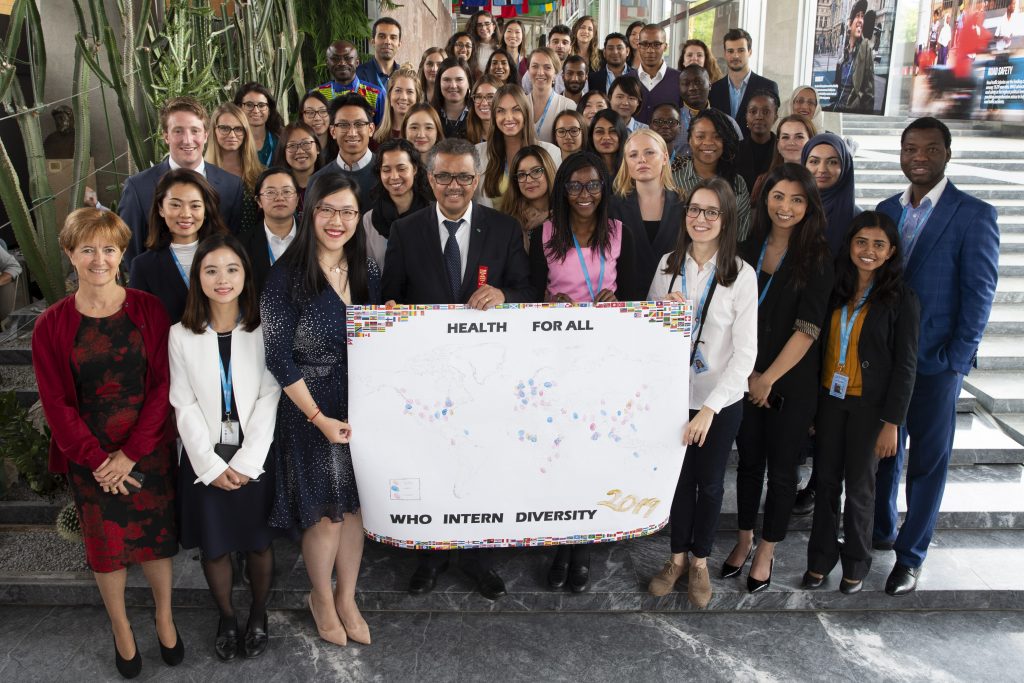
With members of the WHO internship programme. Credit: WHO/Christopher Black
SF: Getting support to the WHO from private philanthropy remains a thorny issue. You hear a lot about the disproportionate impact of foundations or private groups at the WHO despite the adaptation of the framework for the engagement of non-state actors. What do you say to critics?
TAG: What we tell them is that when we cooperate with philanthropic organisations, we do it on the basis of WHO’s priorities. For instance, we truly believe that SRHR (sexual and reproductive health and rights) should be a priority for WHO because many countries told us that it’s important for them and as long as we focus on what country needs are, then working together should not create any suspicion.
SF: This year will be forever defined by the pandemic, and you have had a front-row seat for the entire journey. Covid-19 has exposed the stark weaknesses of national health systems as well as the incoherence and insufficiency of health financing, the state of unpreparedness of many countries and the disproportionate impact of the pandemic on the poor, the uninsured and historically marginalised communities. You’ve made it very clear that national governments should be leading coordination of their country’s response, but what is the role of philanthropy in helping to mobilise political will and contribute resources to ensure an equitable response?
TAG: Losing more than a million people is a disaster. As you rightly said, many of these deaths could have been averted if we had a strong primary healthcare and strong public health. It’s very strange to see that the death toll and infection rates are higher in high-income countries. The reason for that is they have invested in medicine but neglected public health and primary healthcare. That’s where we can do better in emergencies or even prevent an emergency from happening. WHO has been warning about this. Maybe many Asian countries performed well and listened because of their own experience from SARS. That’s why Vietnam did well, South Korea did well – these are neighbours of China that should have been affected more than countries further away.
SF: You mention strong public health systems, and even low-income countries like Rwanda that have a very strong primary healthcare system have fared very well in this pandemic.
TAG: Yes. There is a view in some quarters that primary healthcare is for low-income countries. That has led to some high-income countries not prioritising it. I am convinced it’s the other way round, because WHO’s knowledge and experience is the sum of all approaches and countries. We developed a test kit with Germany, it worked very well, it’s still working. Such collaboration, between WHO and high-income countries, produces dividends for the world. WHO does not work only for low-income countries. It is in the interests of all countries, high, middle and low income, to collaborate among themselves and with WHO and the multilateral system.
Philanthropic organisations can also invest in high-income countries, not just in developing countries to create awareness of the need to strengthen primary healthcare.
SF: You said in April that if you politicise the virus, you’ll end up with many more people losing their lives, and you’ve reminded us to focus on values like solidarity and love and resilience.
TAG: When I remarked in April about people unnecessarily dying, there were 84,000 deaths, now it’s October 15, the numbers are 1,087,000, and we have 1,003,000 more dead. I still believe the politicisation was a key reason behind all these deaths.
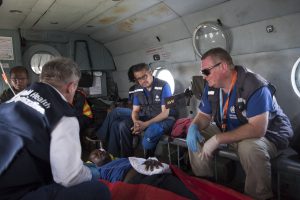
Accompanying the helicopter evacuation of a wounded health worker in the Democratic Republic of Congo. Credit: WHO/Junior Kannan
In WHO, we saw it coming. It’s just like when you feel something, when you see something, when you’re worried about something, when you see the trends, you develop this fear inside, ‘Oh we’re heading this way’. We could see that trend. It’s not without reason by the way, it’s not without evidence. We could see the trend. The only thing you need to do is to connect the dots.
When you look back now, and consider the number of deaths we see today, this was actually a very insignificant representation of this situation now, so what we said was true, we wish it wasn’t true. And it’s very sad and it could have been prevented.
SF: Among the many downstream effects of this pandemic, the impact on the health and rights of women and girls around the world is of particular concern. Women represent the vast majority of frontline health workers, and political and religious leaders who are hostile to women’s bodily autonomy have used the pandemic as an excuse to categorise sexual and reproductive health services as non-essential. What is at stake here and what kind of guidance is WHO providing in this area?
TAG: Sexual and reproductive health and rights (SRHR) were a contentious issue in global health even before this emergency. For me, the health of women is central to the family and to society. I am a very strong believer that by guaranteeing sexual and reproductive health and rights you can even bring countries into the path of prosperity because that’s how you release the energy of the women to contribute to the economy and the focus on women and girls is more important than ever. So when people say ‘we’re in an emergency, this is not the right focus’, my answer is that the crisis aggravates the situation, and this is actually when we should do even more, not less. With philanthropic organisations, I think the thing we need to do is push, push, push. We now meet regularly virtually with civil society and we’re also installing a youth council. We need to leverage those contributions. But it should start from WHO. WHO should focus on doing the right things based on science and evidence, and SRHR should be at the centre. I hope you will support those civil society and youth initiatives so they will be more active and add their voices.
SF: I agree that philanthropy can help drive positive impact on global health, but we also have to grapple with the reality that there is a colonial and often very paternalistic history in global health and philanthropy. Many funders are based in the Global North, trying to solve ‘health issues’, concentrated in the Global South without the wisdom and the perspective of those most affected. How can we harness the power of private philanthropy to address some of these imbalances?
TAG: As you say, only communities know their problems and support should be tailored to them, but they’re also ready to listen. Something that they see is important, like family planning, they accept. The issue is how can we discuss this honestly with funders. When it comes to addressing global health problems, it’s better to align with the needs at the country level, listen to those who should be supported and tailor the support based on that. But as you rightly say, there is the power imbalance and those who have the power, whether it’s political or financial, try to dictate.
SF: This issue of Alliance is also covering mental health as a key part of the global health agenda and we are enormously grateful for how much emphasis the WHO has given this issue. I just want to ask: how do you personally stay calm and maintain your own mental health given the challenges and the pressure of leading the WHO in the middle of a global pandemic?
TAG: I don’t know if I have advice! I can tell you one story though. One of our colleagues was asked how WHO kept going in the midst of a crisis and he said, ‘we do what we do in good faith, and we have faith in each other’. If you say ‘in good faith’ it means internally you are at peace. When you have faith in each other, it means there is trust and good relationships that emanate from everybody doing things in good faith. I have seen WHO’s worth, because it’s tested now, and through this very difficult time I have seen how my colleagues actually work and behave. Another thing about good faith is that it keeps you in balance. Of course, we were affected, because we’re human beings. But the most important thing was we were focused on the pandemic and the people dying. So you have a bigger agenda; you cannot confront those who are trying to distract you, you focus on the most important thing which is saving lives. We need to think about each other, to really help each other. That’s how we can finish this pandemic.
SF: Finally, what message do you have for the philanthropists who want to do more to support your efforts but are struggling with the complexity of the current context?
TAG: I have already mentioned things that philanthropic organisations can do to help us to advocate for countries to focus on public health and primary healthcare. As you know, after I became director-general in 2017, we have been designing the transformation of WHO, which we officially launched in March 2019. But even before then, while designing WHO to make it fit for the world’s current needs, we were already implementing changes – the low hanging fruit – side-by-side with the design.
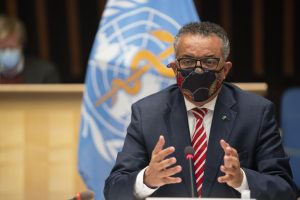
Special Session at the WHO on the response to Covid-19. Credit: WHO/Christopher Black
It is true that the agenda was influenced by a threat that a pandemic may happen and, when we look back, many of the new additions were very relevant to prepare WHO for this and future situations.
We established the independent Global Preparedness Monitoring Board to ensure preparedness for global health crises. We created a division focused on improving emergency preparedness in countries around the world, especially the most vulnerable. We appointed the first-ever chief scientist to drive research and development on emerging diseases, and established the WHO Academy, which is now training five million medical personnel for emergencies. The WHO Foundation is a new addition to mobilise resources. So one more thing I would like to ask philanthropic organisations is to help us ensure that these transformation ideas are implemented properly.
Second, I call on philanthropic organisations to please help us ensure sustained investment in primary healthcare and emergency preparedness.
Third, our aim is to make WHO a learning organisation. We have a transformation implementation unit which we want to drive continuous improvement, because change is a constant, so helping us strengthen that unit would be really great. We need support from philanthropists to implement these chances and to help prepare better for the future, so what happened never happens again.




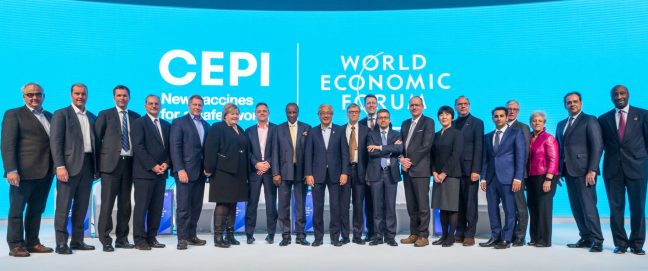

Comments (0)